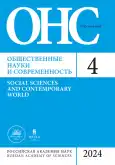Naturalization of Culture in Institutionalism-Infused Study of International Transformations
- 作者: Strezhneva M.V.1
-
隶属关系:
- Primakov National Research Institute of World Economy and International Relations of the Russian Academy of Sciences
- 期: 编号 4 (2024)
- 页面: 7-18
- 栏目: Modern Interpretations of A. Bogdanov’s Tektology
- URL: https://journals.eco-vector.com/0869-0499/article/view/676198
- DOI: https://doi.org/10.31857/S0869049924040016
- EDN: https://elibrary.ru/ZICAYM
- ID: 676198
如何引用文章
详细
Methodological dimensions in the study of institutional transformations in international relations are discussed, allowing to better explain the relationship between discourse, institutions and behavior of states on the world stage. The concept of international society, borrowed from the English school, serves as the basis for the research. In agreement with the theory of organization by A. Bogdanov, international society is treated as an assemblage, consistently interacting with its evolving sociocultural environment. The two components of this combination do not constitute any rigid dichotomy (of material and ideal or of objective and subjective). An original analytical scheme of their relationship is offered, implying the idea of “naturalization” being undergone by institutions as collective representations in the process of constructing international reality. The scheme allows us to distinguish more clearly between factors such as culture or ideology, on the one hand, and the international context of the struggle for the preservation/change of sociocultural norms embodied in institutionalized rules, i.e. social reality, on the other hand. Particular attention is paid to the political significance of the norms of international law. The process of their “naturalization” is illustrated by two cases from international legal practice. They confirm, in particular, the considerable role of the so-called swing states (South Africa, Indonesia) in the current shifts in the international order.
全文:
作者简介
Marina Strezhneva
Primakov National Research Institute of World Economy and International Relations of the Russian Academy of Sciences
编辑信件的主要联系方式.
Email: m.strezhneva@imemo.ru
ORCID iD: 0000-0002-6561-4367
Doctor of Political Sciences, Professor, Chief Researcher of the Center for European Studies
俄罗斯联邦, Moscow参考
- Bogdanov [Malinovskij] A.A. (1911) Kul’turnye zadachi nashego vremeni [Cultural Challenges of Our Time]. Moscow: S. Dorovatovskij i A. Charushnikov. 92 p. (In Russ.)
- Bogdanov A.A. (1922) Ocherki organizacionnoj nauki [Essays in Organizational Science]. Metodolog.ru. (https://www.metodolog.ru/00051/00051.html) (in Russ.)
- Bogdanov A. (2003) Empiriomonizm: Stat’i po filosofii [Empiriomonism: Essays in Philosophy]. Moscow: Respublika. 400 p. (In Russ.)
- Gusarova M.A. (2021) K voprosu o roli Gugo Grociya v stanovleniiy usnaturalistskogo tipa pravoponimaniya v epohu Novogo vremeni [The Issue of Hugh Grotius’ Role in the Formation of the Jusnaturalist Type of Legal Thinking in the New Age]. Society: Politics, Economics, Law. vol 90, no. 1, pp. 71–75. https://doi.org/10.24158/pep.2021.1.13 (in Russ.)
- Delyoz Zh., Gvattari F. (2010) Tysyacha plato: kapitalizm i shizofreniya [A Thousand Plateaus: Capitalism and Schizophrenia]. Translation from French by Svirsky Ya. Moscow: Astrel. 895 p. (in Russ.)
- Kezin A.V. (2006) Naturalisticheskie podhody v epistemologii XX veka [Naturalistic Approaches in 20th Century Epistemology]. Moscow: INION RAN. 100 p. (in Russ.)
- Klejner G.B. (2023) Sistemnaya metodologiya Aleksandra Bogdanova v kontekste sovremennogo ekonomicheskogo mirovozzreniya [Alexander Bogdanov’s System Methodology from the Perspective of the Modern Economic Worldview]. Voprosy Ekonomiki. no. 3, pp. 24–39. https://doi.org/10.32609/0042-8736-2023-3-24-39 (in Russ.)
- Mesudi A. (2019) Kul’turnaya evolyuciya. Kak teoriya Darvina mozhet prolit’ svet na chelovecheskuyu kul’turu i ob’edinit’ social’nye nauki [Cultural Evolution. How Darwinian Theory Can Explain Human Culture and Synthesize the Social Sciences]. Moscow: “Delo” RANHiGS. 384 p. (in Russ.)
- Shevchenko V. (2020) Chto ne tak s teoriej assamblyazhej? [What is Wrong with the Assemblage Theory?]. Logos. vol. 30, no. 5, pp. 131–164. https://doi.org/10.22394/0869-5377-2020-5-131-161 (in Russ.)
- Bull H. (1977). The Anarchical Society: A Study of Order in World Politics. London: Macmillan. 335 p.
- Cook M. (2021) Australia’s South China Sea Challenges // Lowy Institute Policy Briefs. 26 May. (https://www.lowyinstitute.org/publications/australia-s-south-china-sea-challenges)
- DeLanda M. (2006) Deleuzian Social Ontology and Assemblage Theory // In: Deleuze and the Social. Ed(s): Fuglsang M., Sorensen B.M. Pp. 250–266.
- Durel L. (2024) EU Border Carbon Adjustment Compliance and the WTO: The Interactional Evolution of Law // Journal of International Economic Law. Vol. 27. Pp. 18–40. https://doi.org/10.1093/jiel/jgae007
- Elias N. (2001) The Society of Individuals. London: Continuum. 258 p.
- The Expansion of International Society (1984) Ed(s): Bull H., Watson A. Oxford: OUP. 490 p.
- Flockhart T. (2016) The Coming Multi-order World // Contemporary Security Policy. Vol. 37. No. 1. Pp. 3–30. http://dx.doi.org/10.1080/13523260.2016.1150053
- Flockhart T. (2024) NATO in the Multi-order World // International Affairs. Vol. 100. No. 2. Pp. 471–489. https://doi.org/10.1093/ia/iiae004
- Hirschl R. (2008) The Judicialization of Mega-Politics and the Rise of Political Courts // Annual Review of Political Science. Vol. 11. Pp. 93–118. https://doi.org/10.1146/annurev.polisci.11.053006.183906
- James A. (1973) Law and Order in International Society // In: The Bases of International Order: Essays in Honour of C.A.W. Manning. Ed(s): James A. London: OUP. Pp. 60–84.
- Kronfeldner M. (2006) Is Cultural Evolution Lamarckian? // Biology & Philosophy. Vol. 22. No. 4. Pp. 493–512. https://doi.org/10.1007/s10539-006-9037-7
- Krzyżanowski M. (2020) Normalization and the Discursive Construction of “New” Norms and “New” Normality: Discourse in the Paradoxes of Populism and Neoliberalism // Social Semiotics. Vol. 30. No. 4. Pp. 431–448. https://doi.org/10.1080/10350330.2020.1766193
- Tangkilisan Yu.B. (2019) Sovereignty on Seas: The Making of the Declaration of Djuanda 1957 // In: Proceedings of the fourth Asia-Pacific Research in Social Sciences and Humanities, Arts and Humanities Stream (AHS-APRISH 2019). (https://www.atlantis-press.com/proceedings/ahs-aprish-19/125987317)
- Taylor D. (2009) Normativity and Normalization // Foucault Studies. No. 7. Pp 45–63.
- The Globalization of International Society (2017) Ed(s): Dunne T., Reus-Smit Ch. Oxford: OUP. 520 p.
- Wight M. (2022) Why Is There No International Theory? // In: Yost D. (ed). International Relations and Political Philosophy. Oxford: OUP. Pp. 22–38. https://doi.org/10.1093/oso/9780198848219.003.0002
- Zeleny M. (1988) Tektology // International Journal of General Systems. Vol. 14. No. 4. Pp. 331–342. https://doi.org/10.1080/03081078808935022
补充文件









